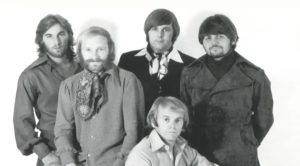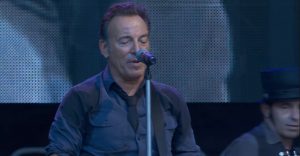The Legendary Led Zeppelin Show That Didn’t Happen

via Youtube @WatchPhilaMOCA
January 20th, 1969. As Richard Nixon took the oath of office in Washington D.C., across the state in Wheaton, Maryland, a different kind of history might have been brewing. (Xanax) Legend has it that on that very night, amidst the pomp and circumstance of the inauguration, a relatively unknown band called Led Zeppelin stepped onto the stage of a humble gymnasium. With amps cranked and teenagers bouncing, they delivered a blistering set to a mere 50 souls, unknowingly planting the seeds for a rock and roll dynasty.
But hold on a minute. As much as we want to believe in the fairy tale, a nagging whisper suggests otherwise. There’s no photographic evidence, no concert flyers, no concrete proof beyond the hazy memories of a handful of witnesses and the word of a radio DJ who claims to have organized the event.
The venue itself, the Wheaton Youth Center, has long since been demolished, the echoes of forgotten gigs swallowed by the march of progress. So, did Led Zeppelin truly grace that small-town stage, leaving a hidden spark in the heart of Maryland? Or is it simply a tantalizing whisper, a rock and roll ghost story fueled by nostalgia and wishful thinking?
The mystery remains, adding an intriguing layer to the Zeppelin legend. Whether or not they played Wheaton, the very possibility of it paints a poignant picture of a band on the cusp of greatness, sharing their raw power with a handful of lucky souls before the world caught on.
Did Led Zeppelin really play here?
With Nixon sealing his inaugural ceremony mere miles away, a handful of Maryland teenagers swear they witnessed a different kind of history unfolding in a modest gym that night. While photographs, ticket stubs, and posters remain frustratingly absent, the memories of those present paint a vivid picture of a transformative, albeit unconfirmed, musical encounter.
Marc Elrich, now Montgomery County Executive, vividly recalls the band’s electrifying performance amidst the winter chill. Anne Marie Pemberton, an engineer, can still conjure the spatial arrangement of the four young rockers on stage. Even Tom McAleer, a liquor salesman, remembers the pristine white Chuck Taylors he wore to witness the nascent legends.
These personal testimonials, passed down like whispers through generations, have fueled the myth of the Wheaton concert, captivating local filmmaker Jeff Krulik. So enamored by the story, Krulik crafted Led Zeppelin Played Here, a 2013 documentary that delves into the recollections of witnesses, explores the historical context of the music scene, and reflects on the evolution of live music in the D.C. region.
This compelling film serves as a poignant testament to the power of collective memory, preserving not just the potential echoes of Led Zeppelin’s guitars in a forgotten gym, but also the communal thrill of sharing a transformative artistic experience. On January 20, 2019, as the 50th anniversary of the supposed concert dawns, the AFI Silver Theatre in Silver Spring will screen Krulik’s film, inviting audiences to step into the shadows of rock and roll history and ponder the captivating mystery of “did they or didn’t they?”
One of rock’s most compelling mystery
The quest for answers regarding the elusive Led Zeppelin concert at the Wheaton Youth Center culminated in Jeff Krulik’s documentary, leaving a bittersweet symphony of doubt and intrigue. While concrete proof remained elusive, whispers spun into compelling narratives, building a case for the night’s reality.
Krulik, himself leaning towards the concert’s occurrence, found strength in the consistency of eyewitness accounts. The band’s reported frustration with the acoustics and sparse crowd resonated with their grueling tour schedule – Detroit the night before, 600 miles away. The circumstantial evidence fits the puzzle.
Moreover, the era’s “wild west atmosphere” of the concert industry offered a plausible explanation for the absence of flyers or posters. Back then, word-of-mouth and radio DJs like Barry Richards, whom Krulik interviewed, ruled the roost. Richards vouched for the concert, even recalling reprimands from Zeppelin’s manager for the meager turnout.
Despite the accumulated testimonies and intriguing context, the phantom concert tag stuck. In an age of instant documentation and ubiquitous digital footprints, the lack of tangible proof cast a long shadow. Krulik acknowledged this yearning for definitive answers, recognizing the elusive nature of the truth in this historical whodunnit.
Though the definitive answer remains shrouded in the mists of time, the hunt for it unearthed a captivating tale of a potential historical crossroads, where local teenagers might have witnessed the raw beginnings of a musical titan. Krulik’s documentary stands as a testament to the power of oral tradition and the enduring allure of unconfirmed legends, leaving the door to the “what if?” perpetually ajar.
Jeff Krulik’s efforts to save the youth center’s legacy
Krulik’s quest for Led Zeppelin’s phantom concert wasn’t just about the band itself. The story held its own captivating allure. A Bowie, Maryland native, Krulik saw the center, built in 1963, as a vibrant character in its own right, a silent witness to countless local stories. When the county planned its demolition to make way for a new complex, Krulik felt compelled to document its legacy.
For him, the building wasn’t just bricks and mortar, but a testament to a bygone era. It stood as a symbol of a time when local music scenes thrived, young dreams took flight, and shared experiences forged community bonds. He fought tooth and nail to save it, hoping to preserve a physical fragment of that history. Sadly, his efforts fell short.
The very building he desperately wanted to save, the one that spurred his investigation into the Zeppelin concert, might very well have hosted the legendary performance that remained shrouded in doubt. The tantalizing possibility, forever unconfirmed, added another layer to the center’s narrative, blurring the lines between tangible proof and cherished local lore.
Whether Zeppelin graced the stage or not, the Wheaton Youth Center’s story resonates, reminding us of the ephemeral nature of history and the enduring power of places that inspire, ignite, and fade, leaving behind only whispers and the whispers of “what if?”.












